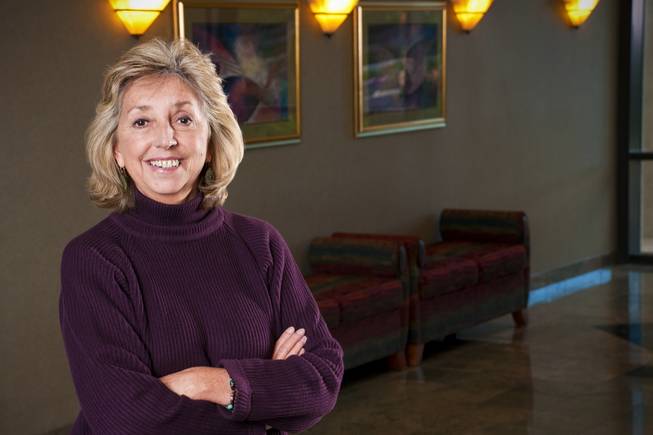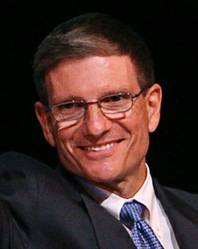
Dina Titus lost her run for the state’s 3rd Congressional District by less than 2,000 votes to Joe Heck.
Wednesday, Nov. 10, 2010 | 2 a.m.
Sun Coverage
Sun archives
- Dina Titus swept away by Tea Party wave (11-3-2010)
- Joe Heck defeats Dina Titus in 3rd District House race (11-3-2010)

Joe Heck
Some political science teachers take a leave of absence to accept a fellowship. Others travel. Some just go on a refreshing hiatus.
Then there’s Dina Titus, who returns to her UNLV professorship after one term as a congresswoman, swept into office two years ago on the coattails of Barack Obama and swept out largely for that same association. The Sun asked Titus what lessons she learned, how it will affect her approach to teaching and what’s next.
What will you tell your students about your time in Washington?
It was a historic time — the first African-American president, some of the legislation that was passed. It was exciting to be part of that, and it was fun to see firsthand what I’ve been teaching all these years. I’ve seen it in Carson City, but this was really it.
How will your experience change your teaching?
It’s going to be interesting to be able to be an observer for really the first time in 20 years because I’ve always been in office, in the Legislature. So to be able to be a little more critical, a little more free with observations will be nice. In the past, you never wanted to risk someone thinking you were taking your own politics into the classroom.
Were you thrown any loops they don’t teach in political science textbooks?
I can’t think of any. I’m pretty much a realist.
What lessons will you teach students about your re-election bid?
The story of this election will be the Supreme Court decision (that loosened campaign finance restrictions on corporations and outside groups). Almost $9 million spent against us from outside, unnamed sources, starting back in the spring with the health care vote. Just the amount of money that was poured into all the races from those kind of sources.
Do you think that was the tipping point — the outside money?
Yes, because all of that money was negative money.
Were you surprised to lose?
You never take anything for granted. You want to win. But we knew from the day we got elected that this was a tough district. It was drawn to be a swing district. I was the first Democrat to hold it. And as the economy got worse and worse, it’s very difficult to prevail in that kind of environment. It’s kind of a perfect storm — the most people, the most problems, and the worst economy since, well, a whole generation at least.
When did it hit you that you lost?
When we watched the numbers come in. We didn’t rule out the possibility until 50 percent of the vote was in. But it was one of the closest races in the country, and we were very proud of that. You know, in politics, there’s no silver medal but you want to have a good showing and you want to be proud of the race you ran and the things you did.
Was it more heartbreaking because it was so close?
You think, oh 2,000 votes, if we had another week we could have won. But on the other hand, I’d much rather lose by 2,000 votes than go down by 14 points or 10 points like a lot of people did across the country. I think that says a lot of people liked what we were doing, a lot of people got our message. It wasn’t an overwhelming mandate for the other side, and it leaves our options open.
Why do you think you lost?
It was a combination of things — the tough economy; anti-incumbency; a lot of the misinformation that got out there early about things like health care; $9 million in negative ads against us. My campaign team, though, ran a flawless campaign and I don’t think anybody will point out any problems we had, any mistakes we made.
Were you surprised at the number of House seats Republicans took?
I was. There were some people who lost that I didn’t have any idea they were in trouble in their districts, particularly all the big chairs. So many of the freshmen who lost, it didn’t really matter how they voted. I voted for health care, Tom Perriello voted for health care. But a lot of the Blue Dogs voted against health care and they still went down.
Do you think you lost, or Joe Heck won, on one specific issue?
If there was, it would probably be Obamacare, but I don’t think it was any one. You got to remember, almost as many people wanted that as didn’t. I think it was a combination of things.
How much do you think the health care vote hurt you? Do you wish you had opposed it?
I could have never voted against the health care bill. I campaigned on it. I spent a lot of time in the state Legislature working to get better health care and more coverage. I fought to get some amendments in it that I thought made it better. And I look in the mirror in the morning and think, I helped get health care for children with disabilities. What could be better than that?
Your campaign was fairly negative. Do you think that hurt you?
I don’t. We had to fight back. We started out positive and ended up positive but that didn’t move any numbers. If we hadn’t fought back, they’d have said, why didn’t you fight back, why didn’t you go after him like they’re going after you? People say they hate negative ads, they get sick of them, but those are the ones they remember.
Do you think it was fair for voters to lump you in with the Democratic establishment when you were new to Congress?
I was only there 18 months before the elections started so I wasn’t a longtime Washington incumbent. But I think it was just the mood. I was there, so I had to take the blame. I think it was an overall climate of anger and frustration, and I just happened to be in that place.
Is that frustrating?
Well, I’m not dwelling on that. I’m thinking about all the things we accomplished and looking ahead to the future. There are parts that are kind of irritating, but it’s not something I’m going to lose sleep over because it’s not something I can change.
Do you think name recognition hurt you because people associate you with the “Dina Taxes” label from past negative campaigns?
In this cycle, they didn’t really have to drag up things from the past. All they had to do was focus on the deficit, the budget and the misinformation about taxes in Washington. You didn’t see them dragging up any of the ads like (former Rep. Jon) Porter did last time. It was all the here and the now, and that was something you couldn’t fight. The day I was elected, Nevada already led the country in foreclosure. We already had the trillion-dollar deficit. We already had the two wars. But people have short memories. They voted you in there to make changes, they wanted change to be made, and sometimes you just can’t make it that fast. It didn’t have anything to do with a legislative record or anything like that. But at least they didn’t make fun of my accent.
Were you satisfied with your get-out-the-vote effort?
It was the best ground game I’ve ever seen. We turned out voters. But we didn’t have the luxury in this district that Sen. (Harry) Reid had of having that big bloc of Hispanic votes. He was able to get Shelley’s (Berkley) Democrats and Reno’s Democrats. And sometimes it’s easier to get lazy Democrats than it is to flip nonpartisans. Labor, environmental groups, women’s groups were strong in turning out voters. With the resources that we had, we couldn’t have done more.
Do you think the results would have been the same if you ran in a different year, without the Reid-Angle race?
Probably. It attracted so much money, so much negativity here, it sucked up all the air in terms of the politics. We weren’t able to let people really know what Heck stood for or what I stood for.
Do you plan to return to politics?
It’s my nature to stay involved. I love politics, that’s why I got in it to start with. I think we did a lot of good, and if there’s some way to continue that, then I’m not going to go away. We’ll be watching things — the redistricting process, what happens with Heck, and we’ll just leave all the options open.
Any advice for your successor?
I don’t know Joe Heck. I don’t know what his priorities are. I know he mentioned that his idea for helping people in foreclosure was to bring down unemployment. Uh, good luck with that. I just hope that he’ll continue the (foreclosure) casework because the people in District 3 are hurting.

Join the Discussion:
Check this out for a full explanation of our conversion to the LiveFyre commenting system and instructions on how to sign up for an account.
Full comments policy